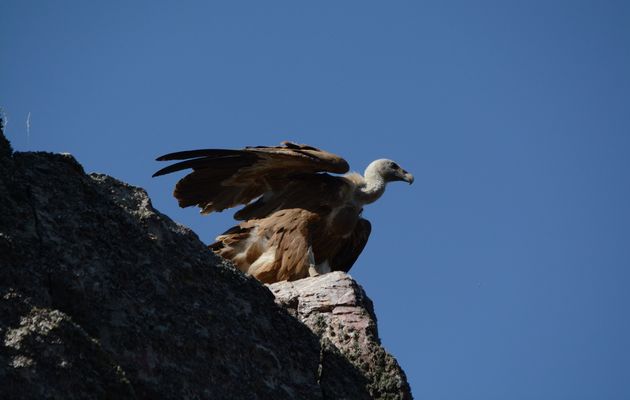Being so ugly, bald and having a taste for dead meat, they tend not to be seen as the most charismatic of animals. Nevertheless, they have certain features which make them unique.
 A vulture. / Antonio Cruz
A vulture. / Antonio Cruz
The Old Testament mentions several different kinds of vultures. Needless to say, they are regarded as unclean animals, as they feed on dead bodies. We find references to the bearded vulture (Gypaetus barbatus) (Lev. 11:13); the lion vulture (Gyps fulvus) (Lev. 11:18; Micah 1:16); and the Egyptian vulture (Neophron percnopterus), among others. Although the translators almost always use the general term “vulture”, the Hebrew terms are usually more specific when referring to these large carrion birds that inhabited the regions of the Bible.
It should be borne in mind that trying to identify birds by the Hebrew name used in the Scriptures involves a certain amount of guesswork, as common onomatopoeic names were often used, or names deriving from the animal’s habitat. However, the identification of vultures is usually a simple matter. On some occasions, it has been translated as “eagle”, even when the Hebrew word refers to “vulture”, and despite the fact that the context clearly shows that “vulture” would be the correct translation (Matthew. 24:28; Luke 17:37).
When corpses were eaten, popular imagination often symbolically associated this with the kingdom of the dead. Hence, leaving dead bodies exposed to the elements so that they would be devoured by carrion fowl implied that they were abandoned by their family and by the gods that the community believed in. It was like handing them over to death (2 Sam. 21: 10; Jer. 7: 33). This was the ultimate threat entailed by war: that the vultures would devour the naked bodies of the fallen (Job 39:30; Mt. 24:28; Ap. 19:17-21).
 An Egyptian vulture, in Spain. / Antonio Cruz
An Egyptian vulture, in Spain. / Antonio CruzDespite the many negative connotations which could be attributed to these birds, the truth is that they play an indispensable role in modern ecosystems. Being so ugly, bald and having a taste for dead meat, they tend not to be seen as the most charismatic of animals. Nevertheless, they have certain features which make them unique. They are the birds that can fly the highest, as was demonstrated in 1973 when a Rüppell’s vulture collided with a plane at 11,000 metres altitude over the Ivory Coast. Studies of their physiology have revealed certain cardiovascular adaptations, and adaptations of their haemoglobin, which enable them to breathe in a rarefied atmosphere.
By consuming the remains of other animals, they become efficient recyclers of organic material, thus preventing the spread of disease, and the proliferation of other carrion animals, like wild dogs. The powerful digestive acids that these birds possess enable them to very effectively destroy bacteria that would be lethal for other species, such as anthrax or the cause of cholera. They also have special antibodies which make them effective in combatting botulinim toxins. Thus, even if they consume the body of an animal which died of botulism, they suffer no harmful effects. In sum, they are physiological machines for recycling material in natural ecosystems.
I took these two photos of a lion vulture about to take flight, and an Egyptian vulture – the smallest vulture in Spain -, in Monfragüe (Caceres).

Las opiniones vertidas por nuestros colaboradores se realizan a nivel personal, pudiendo coincidir o no con la postura de la dirección de Protestante Digital.
Si quieres comentar o